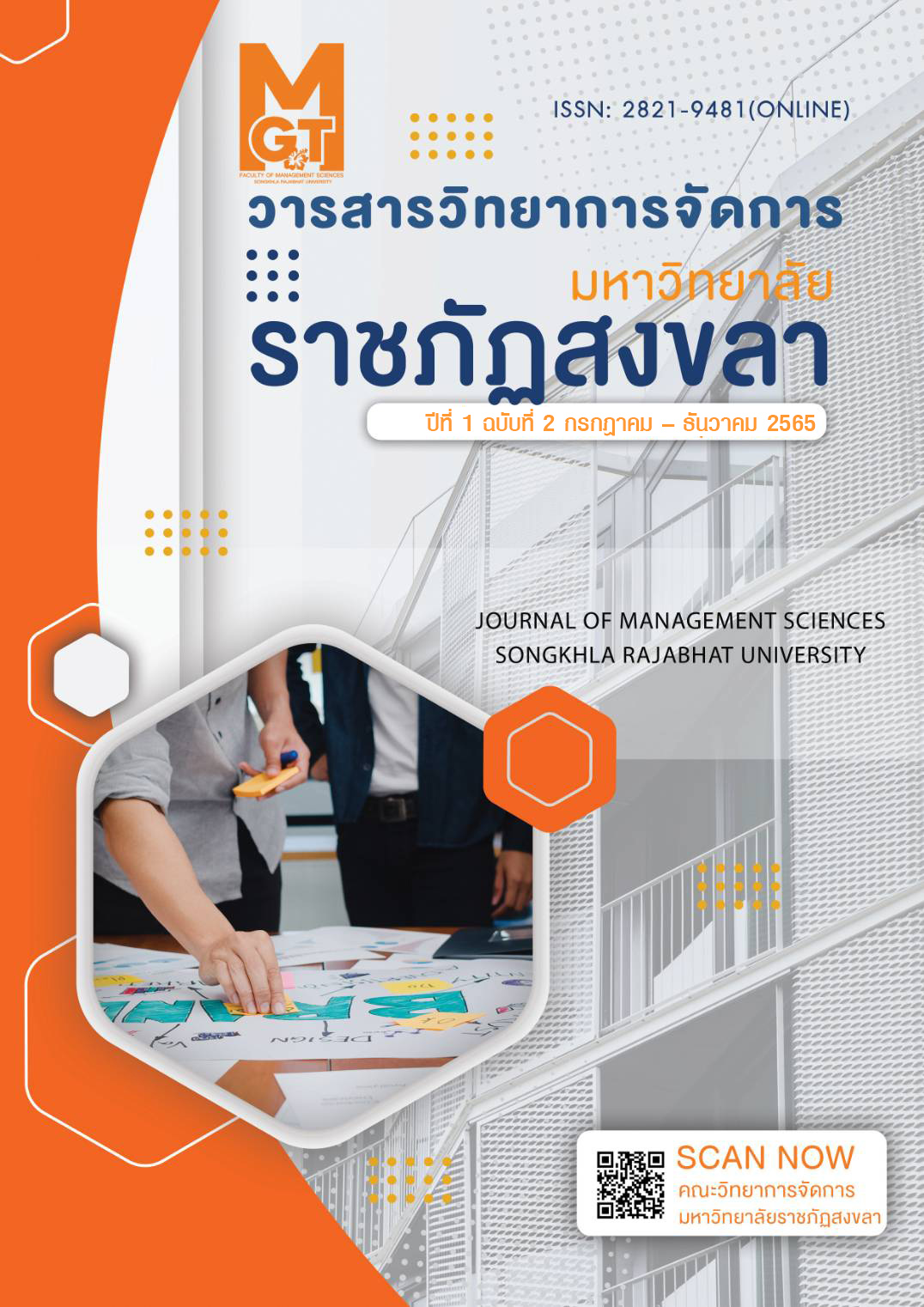การพัฒนาตนเองสู่ความก้าวหน้าในสายอาชีพของบุคลากรสายสนับสนุนมหาวิทยาลัยราชภัฏมหาสารคาม
Main Article Content
บทคัดย่อ
การวิจัยครั้งนี้มีวัตถุประสงค์ เพื่อเปรียบเทียบการพัฒนาตนเองสู่ความก้าวหน้าในสายอาชีพของบุคลากรสายสนับสนุน มหาวิทยาลัยราชภัฏมหาสารคาม โดยกลุ่มตัวอย่างในการศึกษา คือ บุคลากรสายสนับสนุน มหาวิทยาลัยราชภัฏมหาสารคาม จำนวน 206 คน สถิติวิเคราะห์ที่ใช้ในการวิจัยครั้งนี้ ได้แก่ การแจกแจงความถี่ ค่าร้อยละ ค่าเบี่ยงเบนมาตรฐาน Independent t-test และการวิเคราะห์ความแปรปรวนแบบทางเดียว (one-way ANOVA)
ผลการศึกษาพบว่า การพัฒนาตนเองในสายอาชีพ ของบุคลากรสายสนับสนุนมหาวิทยาลัยราชภัฏมหาสารคาม มีการพัฒนาตนเองในสายอาชีพ โดยภาพรวม อยู่ในระดับปานกลาง เรียงตามลำดับ คือ ด้านการศึกษาดูงาน ด้านการฝึกอบรม ด้านการเข้าร่วมสัมมนา ด้านการศึกษาด้วยตนเอง และด้านการศึกษาต่อ ความก้าวหน้าในสายอาชีพ ของบุคลากรสายสนับสนุน มหาวิทยาลัยราชภัฏมหาสารคาม มีความก้าวหน้าในสายอาชีพ โดยภาพรวมอยู่ในระดับปานกลาง เรียงตามลำดับ ได้แก่ ด้านการพัฒนาตนเอง ด้านเงินเดือน และด้านตำแหน่ง บุคลากรสายสนับสนุน มหาวิทยาลัยราชภัฏมหาสารคาม ที่มีเพศ อายุ ต่างกัน รายได้เฉลี่ยต่อเดือน ประสบการณ์ทำงาน มีการพัฒนาตนเองสู่ความก้าวหน้าในสายอาชีพแตกต่างกันอย่างมีนัยสำคัญทางสถิติที่ระดับ 0.05 และบุคลากรสายสนับสนุน มหาวิทยาลัยราชภัฏมหาสารคาม ที่มีหน่วยงานที่ปฏิบัติงาน และระดับการศึกษาต่างกัน มีการพัฒนาตนเองสู่ความก้าวหน้าในสายอาชีพ ไม่แตกต่างกัน
Article Details
เอกสารอ้างอิง
Bunyasut, Y. (2005). Attitudes of social workers towards professional advancement. Social work. Bangkok: Thammasat University, Faculty of Synthetic Society.
Gattiker, U. E., & Larwood, L. (1986). Subjective career success: A study of managers and support personnel. Journal of Business and Psychology, 1(2), 78–94.
Inwang, W. (2020). Human Resource Development for Organization Development. Journal of MCU Social Science Review, 6(2-05), 617–626.
Kaewsonthi, K., & Pattamakom, S. (1981). Handbook for organizing meetings for teaching and learning. Bangkok: Chulalongkorn University.
Kiatchotchai, K. (2005). Seminar for Excellence (Print the 4). Bangkok: Education Publishing House.
Nadler, A. (1987). Determinants of help seeking behaviour: The effects of helper's similarity, task centrality and recipient's self-esteem. European Journal of Social Psychology, 17(1), 57–67.
Peluchette, J. V. (1993). Subjective career success: The influence of Individual difference, family, and organizational variables. Journal of Vocational Behavior, (43), 198-208.
Phuwittayaphan, W. (2013). Human Resource Development Strategy. Bangkok: HR Press Center.
Thananan, S. (2010). Human Resource Development. 5th printing, Bangkok: TPN Press.
Sanamthong, E. (2017). Techniques for career planning and personnel development. Bangkok: Publisher. Ramkhamhaeng University.
Sornchai J. (2020). Self-development starts with love. 0 Buddhist Psychology Journal, 5(1), 29-44.
Susan M. H. (2017). What Is Human Resource Development? (HRD). Retrieved September 6, 2021. From https://www.thebalancecareers.com/what-is-a-human-resource-1918144.


